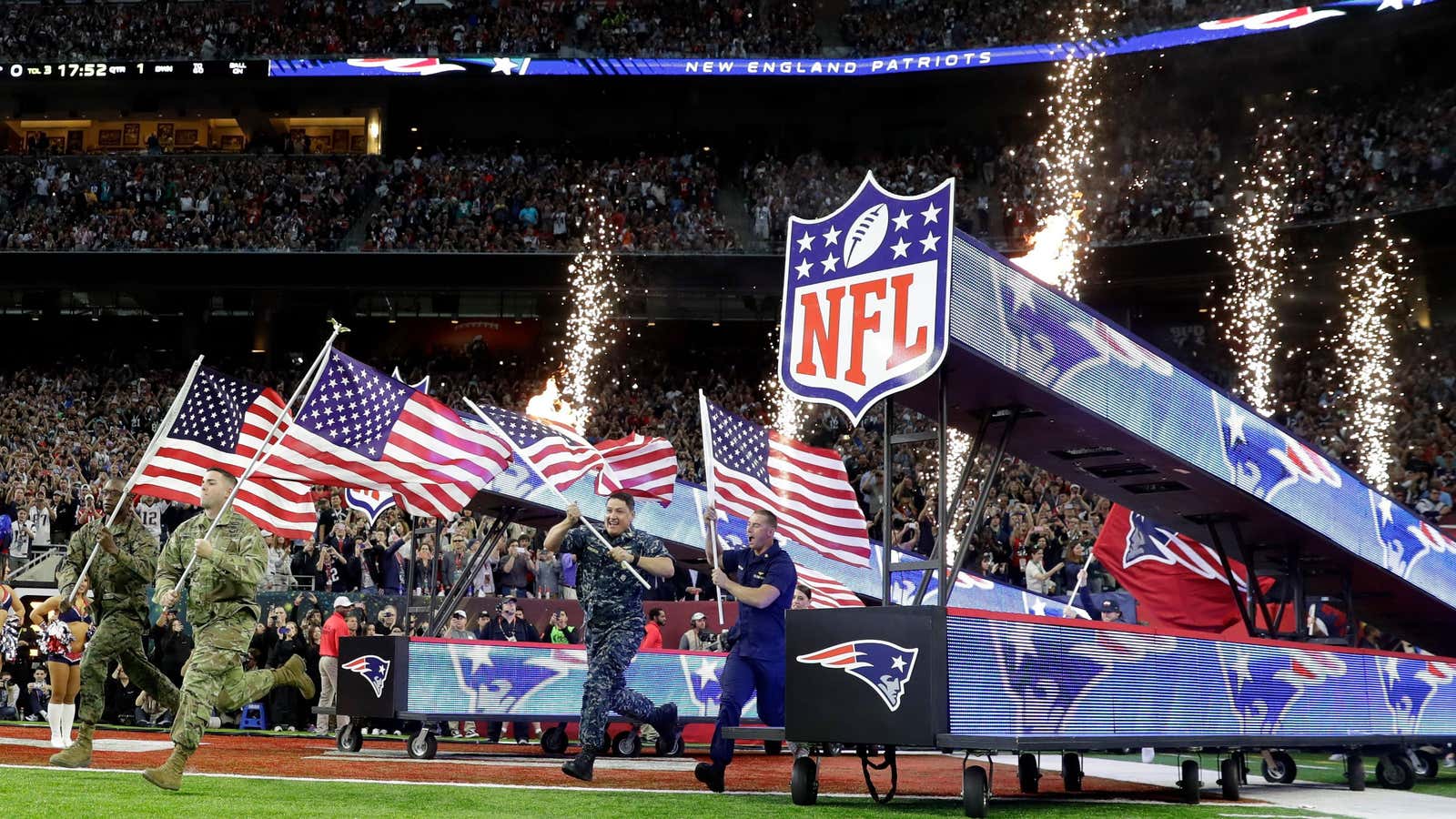This Sunday, I’ll watch the Super Bowl, just as I have each of the last 34 Super Bowls. This year, as in other recent years, I’ll be doing so more out of a sense of obligation than with any real enthusiasm.
Part of my reluctance is aesthetic. I don’t like what the Super Bowl has become, a cultural and entertainment behemoth that swamps the actual football. I’m a sports fan, not a pop music or advertising fan. It’s become harder and harder to pay attention to the game amid the cacophony that surrounds it.
I’m also increasingly uneasy about the ethics of professional American football. Lending it my support—in the form of my time and attention—has come to feel like I’m party to an endeavor that’s morally repugnant.
Football as a condition
It’s not just the ongoing tragedy of head injuries, although that’s a big part of it. It’s become overwhelmingly clear that football players do real damage to their brains as they play for our entertainment, with evidence of chronic traumatic encephalopathy (CTE)—a disease that can lead to memory loss, confusion, and depression—found in 99% of deceased NFL veterans examined in a study. Dozens of former pro and college players have killed themselves, a consequence of CTE.
Once we celebrated the ferocity of players like Ronnie Lott, the San Francisco 49ers safety who would hit opponents so hard he knocked himself unconscious. Now, I cringe at our naiveté.
After decades of denying there were any long-term health risks in playing a manifestly violent sport, the NFL is now rolling out commercials touting its attention to safety. It’s a cynical exercise that should fool no one.
More revealing is the league’s attitude about the health of its former players, many who played before the era of big contracts and who are saddled with enormous medical costs stemming from a range of ailments dating from their playing days. After fighting its veterans in court for years and facing potentially billions of dollars in liabilities, the NFL reached a $765 million settlement in 2013 intended to cover the medical expenses of ex-players who suffered concussions. Receiving their payments has become a medical and legal morass, with the NFL challenging the veracity of their claims, lawyers and insurance companies lining their own pockets, and the vast majority of players still waiting for their share. In at least one case, a deceased player’s family somehow owed money as a result of the broken process.
The NFL as a charade
I’m also repelled by the NFL’s politics, including its exploitation of patriotism—which it conflates with militarism—and its ongoing blackballing of quarterback Colin Kaepernick, the 49ers player who had the temerity to kneel during the national anthem and now hasn’t been able to play since 2016. It’s an unlikely coincidence that his former teammate and fellow kneeler Eric Reid was given six purportedly random drug tests in 11 weeks this season (there’s a 1-in-588 chance of that happening).
Some of my progressive friends have walked away from the NFL out of disgust and an unwillingness to make the necessary internal compromises that following the game now seems to require. I understand their position, and admire their dedication to their principles.
So why do I still watch? Part of it is maintaining the continuity, a desire to read the next chapter in a book I’ve been reading since I was in my early teens. Part of it is a fear of missing something momentous, an incredible catch or a last-second touchdown that will enter into sports lore for eternity.
And part of it—the biggest part—is because I am a fan.
Why football looms so large
The NFL has become a colossus for a reason: The games are thrilling, the athleticism remarkable, the narrative that builds over the seasons compelling. Sunday’s game promises to be no different. New England quarterback Tom Brady, the ageless wonder, defied the odds and returned the much-loathed Patriots to the Super Bowl. He’ll face the upstart Rams—the team he beat all the way back in 2002 to win his first championship—and their head coach, Sean McVay, who is almost decade younger than Brady. That’s good stuff.
There’s something deeper, too, an appreciation of the elemental struggle of the game and a desire to be closer to it. Former quarterback Steve Young said on ESPN recently that playing at a high level “took every ounce” of him, physically, emotionally, and mentally, and that’s why it was so hard for him to retire. Nothing else in his life will ever come close.
Nothing in our lives really comes close, either. We are drawn to that energy, that drama, that spectacle, like a moth to a flame. Beneath it all, the violence and danger that we detest helps make football compulsively watchable. These men push themselves and risk themselves for our entertainment, and we can’t look away.
In truth, I love the sport. Pro football has occupied a large portion of my existence as a fan for decades. It’s part of who I am, and as much as I resent the NFL, I’ll continue to watch, at least for one more year.
